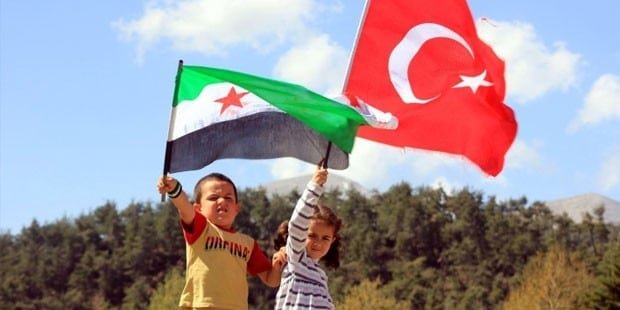
by Andre Vltchek, … with New Eastern Outlook, Moscow
“What do you think you will find here? We are tired of this fight. We are bored of this conflict. All we want to do is to leave this place; to go far, very far away…”
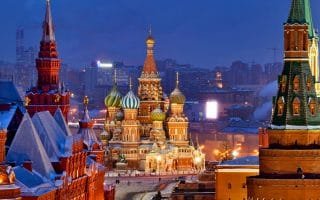
[ Editor’s note: Andre Vltchek gives us a view of the Syrian War from the Turkish side. Poets discussing the war is a new twist here at VT, and how could we say no?
It is an insightful piece – told by and about ordinary people who have been powerless to influence positively what happens in their lives. Welcome to how worthless the right to vote can be in some places.
Corporate media would never interview people like this. Any reporter would get a stern spanking for spending the budget to log the viewpoints of real people. The advertisers don’t care about them, as they are not markets for them, and the pro-war governments would feel cheated out of publicity that was their due, but was wasted.
Turkey is not immune to fake news itself. We were fed a stream of reports about how Erdogan was going to lose. Even from our far away perch, we could see no way that, with all the strings of power that Erdogan and his party held, they would “allow” themselves to be defeated. If Turkey can’t rig an election, then nobody can.
All inquiries to enlighten us as to how he could possibly be beaten were met with the traditional political holy-rollers’ testament of faith. Because they believed it, it was real. In the Intel business, we call this smoking political crack. People say the craziest damn things that are completely logical to them.
VT has done three visits to Syria, with my getting a beach head established as one of the 35 international monitors brought in for the 2014 elections, followed by two team trips. The Syrian counter terrorism conference found Gordon giving the headline address, that the whole terror war was just one little finger of international gangsters at work.
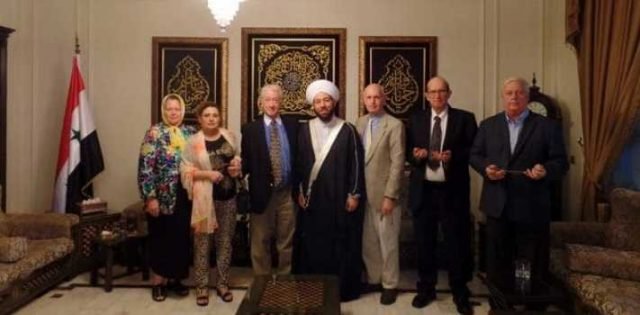
We were not able to take a few extra days to get out to mix with the folks, and up to the front lines at Palmyra, as someone decided to poison us with E-coli to keep us near the bathrooms in the hotel, and zonked out half the time. As Palmyra was eventually destroyed, we were bitterly disappointed.
The third trip was a month before the Russians went in. We were guests of the Syrian Justice minister, their Attorney General, and other than the Grand Mufti, I cannot go into who else we saw.
Syria was losing. Everyone that could get out was trying to, but the Russians changed everything. They were a bit rusty at first, but after a few weeks’ shake-down period, they began doing some damage, and the Israelis were not threatening to nuke Moscow.
Something had changed. Syria did not lose. And VT has had a front row seat … Jim W. Dean ]
 Jim's Editor’s Notes are solely crowdfunded via PayPal
Jim's Editor’s Notes are solely crowdfunded via PayPal
Jim's work includes research, field trips, Heritage TV Legacy archiving & more. Thanks for helping. Click to donate >>

– First published 1 July 2018 –
Turkish-Syrian Border: Confusion, Destruction and Grief
When we first met in 2017, the Turkish poet, Mustafa Goren, stood proudly and defiantly next to a monstrous concrete wall built on orders from Ankara. The partition has just recently separated two towns with the same culture: Turkish Karkamis and Syrian Jarabulus.
The poet then read some of his verses, and my friend, a translator of my books, originally from the city of Adana, tried to keep pace, interpreting.
The poem began with quite an unusual opening, and it warned Europe and its people:
“One day, true leaders of the world will come, and they’ll cut off all the gas and petrol supplies to you, and you’ll find yourself in even deeper shit than the one into which you are throwing this part of the world! You’ll have to burn your designer clothes and shoes, just to stay warm. You forgot, but you will soon be reminded, Europe: we are all human beings!”
He was raising his right hand accusingly, shouting towards the sky. Somehow, he looked like the Soviet revolutionary poet Vladimir Mayakovski.
The poet was obviously indignant. It was 2017 then. Everything at the border was still raw, new, and terribly painful. Everything, good and bad, seemed to be possible: full-scale Turkish – Syria war, even a war between Turkey and Russia, or perhaps a Turkish exit from NATO and much closer alliance with Russia and Iran against the West.
Like so many patriots and thinkers in his country, Mustafa Goren strongly disliked the West. He was expressing his full-hearted support for his friends – the people and the state of Syria.
Stopping the Syrian war was all that mattered to him; it was his mission. He was sustaining himself by selling cigarettes on the street of Carsi Mahallesi; a street that hugs the borderline and now the wall.
He did not care how he was making a living, as long as he had time to create, to write, to recite. He was full of determination, zeal and optimism.
“Turkey is fighting the European Union”
Now, when I met him one year later, things definitely looked different. It was 2018, a different era, and totally different Karkamis.
The wall was still there, as well as the Turkish military operations behind it. The poet was still living and struggling in Karkamis, too, but his face looked defeated and tired. Now he was working in a small café. He was broke. His eyes had lost all their previous shine:
“Turkey is now fighting against the European Union… in…,” he said. But somehow it did not sound convincing.
My comrades and I then drove one kilometer towards the Euphrates River; to the ancient cemetery with a commanding view of the border and the Syrian town of Jarabulus.
Jarabulus – “Foreigners are the Cause of the Conflict”
This has been the best place in the area to take a leak, to film the border and to observe Turkish military operations inside Syria. This time, shrapnel was flying too close, and the explosions were loud.
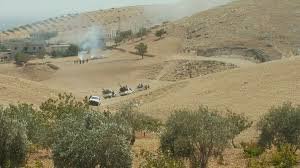
Two veiled ladies who were visiting the cemetery, spotted us.
“What are you looking for in this godforsaken … ,” one of them asked. She gave us a hostile, or perhaps desperate look:
“What do you think you will find here? We are tired of this fight. We are bored of this conflict. All we want to do is to leave this place; to go far, very far away…”
We heard more shells flying nearby, and more explosions.
The lady couldn’t stop:
“Go away! Don’t you understand: we don’t want any foreigners here. Foreigners are the cause of this conflict!”
Karkamis
We tried to find our old contacts, including Mr. Bulent Polat, a Kemalist from the opposition Republican People’s Party. But his shop on the main street was gone, hermetically sealed. Nearby, an armored vehicle was parked, unceremoniously.
Like almost everyone we spoke to in Karkamis, Mr. Polat was a strong opponent of the war. And he was especially against the Turkish involvement in it:
“I know what we are doing there, across the border! To mobilize people against Assad, the anti-government militants supported by Turkey and the West, have been dressing in official Syrian military uniforms, then shoot at the civilians, killing many. Then they say: ‘Assad did it!’ It has been happening all over Syria.”
Now Mr. Polat was gone.
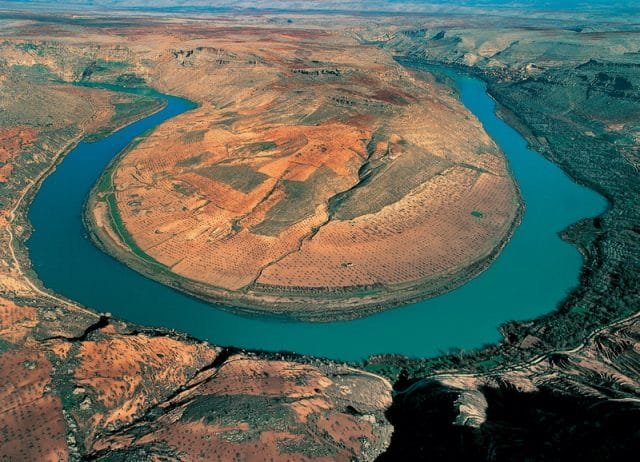
Mustafa Goren, the poet, ordered tea for all of us. Then he sat down at a simple table, holding his head between two palms, before beginning to speak:
“Nobody wants to stay here, at the border, anymore. In Karkamis, there is more Syrians than Turks, now. If Syrians leave, the whole place will turn to a ghost town.”
Then he begins mixing everything together:
“Turkey is not fighting against the PKK and the Kurdish terrorist groups here and in Syria – it is fighting against the European Union. This is our own, internal issue, and if we have to die in this fight, we will!”
Such discourse can be heard all over Turkey. It is difficult and for many foreigners, hard to follow, but it is how it is. Turkey is in a complex transition: from where is obvious, but to where, almost no one knows.
“Mustafa,” I asked him softly. Despite all this pain, desperation and confusion, he is my comrade, a fellow poet. “What about Russia?”
His eyes softened up, as well as his entire facial expression:
“Russians never stabbed Turks in the back. During WWI, they helped us against the West, at Galipoli. They are honest people. We have to coordinate with the Russians…”
He nods towards the explosions. For a while, we sit quietly, listening. Then we embrace. It is time to go.

Karkamis is getting de-populated. It is alarming but understandable. It is becoming truly dangerous to live here. Plus, there is almost no work left in this area.
The entire frontier region used to rely heavily on trade with Syria. There were strong friendships forged between the individuals and families on both sides of the border. People were visiting each other, and they were intermarrying. Goods and services were flowing between Turkey and Syria almost freely.
Now, there is a full stop. The border can only be crossed by armored vehicles, tanks, and ambulances. They are going back and forth, bringing soldiers, carrying the wounded and even corpses. No civilian can pass.
Elbeyli – a Spy Hive
Further west, Elbeyli town is a bizarre hive of spies, a fortification. Everything here is monitored. It is because from here, the Turkish military forces are constantly invading Syrian territory. Here, no one dares to speak. To ask questions leads to immediate phone calls, arrests and interrogations.
Now, many villages around Elbeyli are half-empty. It is an eerie sight. The war has ruined entire communities.
What is thriving is the construction business. Not of the infrastructure, but of the military bases, spy antennas and above all, of the walls. An enormous, monstrous wall, which separates two countries – Turkey and Syria, in the past two inseparable sisters – is now scarring this ancient land. It is around 900 kilometers long, they say. How much money, how much concrete is being poured into it, and why?
Killis Bombed to justify Turkey’s Invasion
We are shown destroyed walls of a house; a place “where rockets fell recently from the Syrian territory”. This is what the Turkish government uses as its justification for the invasion.
The local people have it all very clear. Several of them declare openly, but without revealing their names:
“If only the Turkish government and military would coordinate their operations with the legitimate government in Damascus!”
Things are tough in Killis. Like elsewhere along the border, businesses are closing down. An owner of a kebab stall couldn’t find any job for more than a year and had to try his luck in far-away Jakarta; in Indonesia which is much poorer than Turkey. He came back, had some luck and has now turned into an ultra-nationalist:
“Now the world can see the power of Turks!” He declared, passionately, voicing his full support for the invasion.
But here, at the border, he is clearly in the minority.
At a barbershop, “Salon Hassan”, several people are gathered, just in order to discuss politics. The most common assessment of the situation is:
“The biggest mistake is that the Turkish military is not coordinating its operations with President Assad.”
We are told that “some 8.000 of the refugees living in the camps all over the region are now returning back to Syria.”
But Turkey is hosting more than 3.5 million Syrian migrants. The situation is extremely complex, as intercommunal violence between Turks and Syrians tripled in the second half of 2017.
Turkish president Erdogan often declares that it is mainly because of his military forces operating across the border, that so many Syrian refugees now feel safe to return home. “Nonsense”, most Syrian people reply to such claims. “It is because of the Syrian army, President Assad, and his Russian and Iranian allies! Legitimate Syrian government is now winning the war. Only because of that, things are much safer for the Syrian people.”
“We love Russians here,” a local man professed, loudly. Some citizens of Killis also love Erdogan, as well as President Assad of Syria. ‘Too much love?’ Too many contradictory feelings? It is Turkey, after all. Here, nothing is ever simple.
But what is Russia here, to these people? In many parts of Turkey and all over the Middle East, more than a country, Russia became a symbol of defiance, proof that the West and its deadly designs can be confronted and stopped.
It Hinges on Erdogan
Things appear confusing, but in Turkey, they always are. As we drive through this ancient, beautiful but wounded land, my Turkish friend and translator utters, in desperation:
“Erdogan is going to lose during the next elections. I bet he is going to…”
“But is the Turkish policy towards NATO and towards Syria going to change, dramatically?” I wonder.
For a while, there is silence in the car.
“I wish hope,” friend, my comrade says, finally.
He doesn’t know. Of course, he doesn’t. In Turkey, anything is possible.
“I hope Turkey comes to its senses. I love this country,” I say honestly. “I am really tired of hating it.”
“So am I,” he nods.
Different Sides of The Wall
We are literally licking a huge concrete wall. Behind it is Syria, clearly visible, beautiful.
Actually, it is all very simple. People there are fighting against terror and against the Western imperialism.
People here, in Turkey, are still at the wrong side of the barricade. But they are waking up; many of them already understand. They may soon join those who are fighting for the survival of humanity. They may. Hopefully they will.
(Note: as this essay goes to print, Turkish election polls are closing. 56 million voters have been able to cast their ballots, voting simultaneously in parliamentary and presidential elections. According to preliminary results, President Erdogan secured a comfortable lead.)
Andre Vltchek is philosopher, novelist, filmmaker and investigative journalist. He’s a creator of Vltchek’s World in Word and Images, a writer of revolutionary novel Aurora and several other books. He writes especially for the online magazine “New Eastern Outlook.”

Jim W. Dean is VT Editor Emeritus. He was an active editor on VT from 2010-2022. He was involved in operations, development, and writing, plus an active schedule of TV and radio interviews. He now writes and posts periodically for VT.
ATTENTION READERS
We See The World From All Sides and Want YOU To Be Fully InformedIn fact, intentional disinformation is a disgraceful scourge in media today. So to assuage any possible errant incorrect information posted herein, we strongly encourage you to seek corroboration from other non-VT sources before forming an educated opinion.
About VT - Policies & Disclosures - Comment Policy




@ Andrew_Bukanow,
Sie haben Recht mit ihrer Zuschrift, es hat mich genau so berührt. Ich musste an das große
Karthago denken: Es führte drei Kriege:
Nach dem ersten war es noch mächtig
Nach dem zweiten war es noch bewohnbar
Nachdem dritten war es nicht mehr zu finden.
So kann es auch Europa geschehen.
Freundliche Grüsse an das Team VT
Thank you for the translation.
Simple truth… It is more precious to read such first-face stories. Thank you!
Comments are closed.